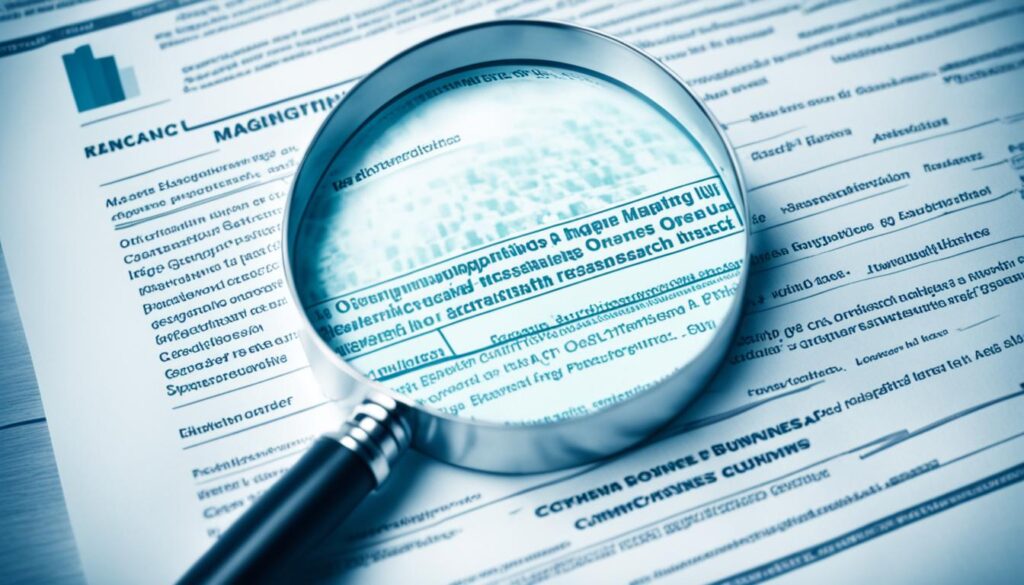Due diligence is a crucial aspect of the business buying or selling process. It refers to the in-depth examination and analysis of a company’s documents, data, and other relevant information by a prospective buyer. The purpose of this process is to identify any potential liabilities, risks, or obstacles that could impact the transaction.
During due diligence, the buyer requests and reviews various documents, such as financial statements, legal contracts, operational records, and industry-specific requirements. This meticulous review helps the buyer assess the true value of the business and make an informed decision about whether to proceed with the purchase.
The due diligence process is time-consuming and requires coordination between the buyer, seller, and professionals like attorneys and accountants. It ensures that both parties have a clear understanding of the business’s financial health, legal standing, operational efficiency, and industry compliance.
Overall, due diligence plays a vital role in mitigating risks, protecting both buyer and seller interests, and ensuring a smooth and successful business transaction.
Key Takeaways:
- Due diligence is the comprehensive examination and analysis of a business’s documents and data during the buying or selling process.
- It helps identify any potential liabilities, risks, or obstacles that could impact the transaction.
- The process involves reviewing financial statements, legal contracts, operational records, and industry-specific requirements.
- Due diligence is time-consuming and requires coordination between the buyer, seller, and professionals like attorneys and accountants.
- It plays a critical role in mitigating risks, protecting both buyer and seller interests, and ensuring a successful transaction.
What Is Due Diligence?
Due diligence is an integral part of the process when a buyer is interested in acquiring a company. It involves requesting and reviewing information from the seller to evaluate the business’s value and assess any potential risks or challenges. Through due diligence, the buyer gains a comprehensive understanding of the company’s financial performance, legal compliance, operational capabilities, and industry-specific requirements.
This diligent investigation provides the buyer with insights into the overall health and viability of the business, influencing the decision to proceed with the purchase or renegotiate terms. By examining financial statements, legal contracts, operational processes, and conducting industry-specific investigations, the buyer can make an informed choice regarding the business’s potential.
Conducting due diligence is a meticulous and time-consuming process that involves collaboration between the buyer, seller, and relevant professionals such as attorneys, accountants, and industry experts. The buyer’s primary goal during this phase is to uncover any hidden risks, liabilities, or undisclosed information that could impact the transaction. This thorough examination allows the buyer to evaluate the business’s true value and make an informed decision based on accurate information.
The due diligence process can be complex, with multiple parties involved and numerous aspects to consider. It requires careful planning, organization, and attention to detail. The buyer must have a clear understanding of the specific information and documents required for due diligence and ensure that these are obtained and reviewed thoroughly. A comprehensive due diligence checklist can help guide the process and ensure that no critical areas are overlooked.
Ultimately, due diligence plays a vital role in the acquisition process, providing the buyer with the necessary information to make an informed decision. It minimizes risks, highlights potential issues, and prepares the buyer for any challenges or obstacles that may arise during and after the acquisition process.
How Do You Prepare for the Due Diligence Process?
To prepare for the due diligence process, it is important to understand what information the buyer expects from you. This may include financial statements, organizational documents, contracts, and other relevant information. It is essential to gather and organize these documents in advance, ensuring they are readily available during the due diligence process.
Designating a specific contact person within your company to handle the due diligence requests can help streamline communication and coordination. This individual will be responsible for liaising with the buyer and facilitating the exchange of information. They should have a thorough understanding of your company’s operations and be able to provide prompt and accurate responses to due diligence inquiries.
Assembling the Due Diligence Checklist
Creating a comprehensive due diligence checklist is an essential step in the preparation process. This checklist should include all the documents and information that the buyer typically requests during due diligence. It ensures that nothing is overlooked, and everything is readily available when needed.
| Category | Documents and Information |
|---|---|
| Financial |
|
| Legal |
|
| Operational |
|
It can be helpful to categorize these documents and information into financial, legal, and operational sections. This allows for easier navigation and retrieval when the buyer requests specific information.
It is also advisable to review the documents and information on the checklist to ensure that they are accurate, up-to-date, and complete. Any missing or outdated information should be retrieved or updated before the due diligence process begins.
Assembling a team of advisors, such as attorneys and accountants, can also be beneficial in organizing and preparing the necessary information. These professionals can guide you through the due diligence process, provide expert advice, and assist in addressing any concerns or issues that may arise.
By preparing in advance and having a well-organized due diligence checklist, you can streamline the process, improve efficiency, and present a professional image to the buyer.
How Do You Navigate the Due Diligence Process?
Navigating the due diligence process is a critical step in buying or selling a business. It involves effectively managing the buyer’s requests for information and addressing any concerns or issues that may arise. The due diligence process is a negotiation between the buyer, who seeks information to make an informed decision, and the seller, who provides the requested information to facilitate the transaction. Both parties must work together to ensure a smooth and successful due diligence process.
Here are some key steps to navigate the due diligence process:
- Establish a Timeline: Create a clear timeline that outlines the due diligence process from start to finish. This timeline should include key milestones, such as the deadline for receiving and reviewing information, and the expiration date for completing due diligence.
- Prioritize Due Diligence Requests: Carefully prioritize and categorize the buyer’s requests for information. Determine which requests are critical for the buyer’s decision-making process and focus on providing timely and accurate responses to those requests.
- Organize Documentation: Ensure that all relevant documents are organized and readily accessible. This includes financial records, legal contracts, operational information, and any other documentation requested by the buyer. By being well-prepared and organized, you can streamline the due diligence process and demonstrate your professionalism to the buyer.
- Maintain Open Communication: Establish open and transparent communication channels with the buyer. Promptly address any questions or concerns they may have, and provide regular updates on the progress of the due diligence process.
- Negotiate in Good Faith: If any issues or discrepancies are identified during due diligence, negotiate in good faith to find a mutually satisfactory resolution. Be open to discussing alternative solutions and consider the buyer’s perspective while protecting your own interests.
In the words of Benjamin Franklin, “By failing to prepare, you are preparing to fail.” This quote emphasizes the importance of thorough preparation and diligent navigation of the due diligence process.
Remember, the due diligence process is not just about providing information; it is about building trust and demonstrating the value of your business to the buyer. By effectively navigating the due diligence process, you can increase the chances of a successful transaction that meets the needs and expectations of both parties.
| Benefits of Navigating the Due Diligence Process | Challenges in Navigating the Due Diligence Process |
|---|---|
| 1. Builds trust with the buyer | 1. Managing multiple due diligence requests simultaneously |
| 2. Demonstrates professionalism and organization | 2. Ensuring the accuracy and completeness of provided information |
| 3. Increases the likelihood of a successful transaction | 3. Addressing potential discrepancies or issues uncovered during due diligence |
Can You Negotiate During Due Diligence?
During the due diligence process, there is an opportunity for negotiation if significant issues or discrepancies are uncovered. Referred to as “re-trading,” this is when the buyer seeks to renegotiate the purchase price based on new information or findings.
It is important to approach negotiations in a fair and reasonable manner, focusing on issues that have a substantial impact on the value or feasibility of the transaction. By addressing these concerns, both the buyer and seller can work towards a mutually beneficial outcome.
The terms and conditions of the due diligence process are typically outlined in the letter of intent or offer. This includes contingencies such as the buyer’s right to withdraw from the contract if certain conditions are not met. Understanding these parameters is essential for both parties involved.
Throughout the negotiation process, it is crucial to maintain open lines of communication and engage in constructive dialogue. Collaborating on potential solutions can help facilitate a successful transaction and mitigate any potential conflicts.
“Negotiation is the art of reaching an agreement, balancing the interests of both parties involved. It is a crucial part of the due diligence process, ensuring transparency and fairness.”
Renegotiating the Purchase Price
One common aspect of negotiation during due diligence is the potential renegotiation of the purchase price. If new information reveals substantial risks or liabilities that were not previously known, the buyer may seek a reduction in price to reflect the updated circumstances.
A fair and reasonable approach to renegotiating the purchase price involves careful consideration of the impact of the identified issues on the overall value of the business. It is essential to provide supporting evidence and documentation to strengthen the case for a price adjustment.
Due Diligence Contingency
A well-crafted purchase agreement often includes a due diligence contingency. This contingency allows the buyer to withdraw from the transaction if the due diligence process uncovers issues that are deemed unacceptable or unmanageable.
The due diligence contingency provides an additional layer of protection for the buyer, ensuring that they have the opportunity to assess and evaluate the target company thoroughly. If the identified issues pose significant risks or challenges, the buyer can exercise their right to retract their offer or negotiate new terms.
Avoiding Unnecessary Re-Negotiations
While negotiation during due diligence is a common occurrence, it is important to minimize the need for unnecessary re-negotiations. Open and transparent communication between the buyer and seller throughout the due diligence process can help identify potential issues early on.
Completing a thorough pre-due diligence assessment can also aid in avoiding surprises during the formal process. By addressing any known issues or concerns proactively, both parties can save time and effort, ensuring a smooth and efficient due diligence process.
Summary
Negotiation during due diligence provides an avenue for the buyer and seller to address any significant issues or discrepancies. It involves fair and reasonable discussions, focusing on matters that significantly impact the value or feasibility of the transaction.
By renegotiating the purchase price or exercising due diligence contingencies, both parties can work towards a mutually beneficial outcome. Open communication and proactive assessment are essential for minimizing unnecessary re-negotiations and ensuring a successful due diligence process.
Is Due Diligence Only Financial?
When it comes to due diligence, financial analysis is undeniably a critical component. However, it is important to note that due diligence extends beyond financial assessments. Different types of due diligence examine various facets of a business to provide a comprehensive understanding of its overall health and potential risks.
Financial due diligence entails a careful examination of the target company’s financial records, including its revenue, expenses, assets, and liabilities. This analysis helps potential buyers gauge the company’s financial stability, profitability, and any potential financial risks that may arise during the transaction process.
Nevertheless, it is equally crucial to conduct thorough assessments of legal due diligence and operational due diligence to get a holistic view of the business. Legal due diligence involves reviewing contracts, agreements, permits, licenses, and legal documents to identify any potential legal liabilities or issues that may affect the transaction.
Similarly, operational due diligence scrutinizes the company’s business operations, management systems, marketing strategies, human resources, and adherence to industry regulations. This assessment helps buyers evaluate the efficiency, scalability, and viability of the business in its current state.
By considering the various aspects of due diligence, such as financial, legal, and operational factors, potential buyers can make informed decisions and accurately assess the value and potential risks associated with the transaction. Each type of due diligence provides unique insights and contributes to a comprehensive evaluation of the target company.
Let’s further understand the different types of due diligence by analyzing the following table:
| Type of Due Diligence | Description |
|---|---|
| Financial Due Diligence | Analysis of financial records and performance indicators to assess the company’s financial health and potential risks. |
| Legal Due Diligence | Review of contracts, agreements, licenses, permits, and other legal documents to identify any legal issues or liabilities. |
| Operational Due Diligence | Examination of the company’s operational processes, management systems, marketing strategies, and compliance with industry regulations. |
Each type of due diligence plays a crucial role in providing a comprehensive understanding of the target company. By considering financial, legal, and operational aspects, buyers can make informed decisions and mitigate potential risks associated with the transaction.
Conclusion
Overall, due diligence plays a critical role in the process of buying or selling a business. It is a comprehensive examination of information to evaluate the value and potential risks associated with a transaction. This thorough process requires careful coordination between the buyer, seller, and relevant professionals.
To effectively navigate the due diligence process, it is essential to prepare by organizing all necessary documents and forming a team of knowledgeable advisors. By promptly responding to the buyer’s requests and addressing any concerns that arise, you can ensure a smooth and transparent due diligence process.
Negotiations are also a part of due diligence, as both parties strive to reach a fair and reasonable agreement based on the findings. Throughout the process, it is important to consider various aspects such as financial, legal, operational, and industry-specific factors, ensuring that all areas are thoroughly assessed.
By conducting thorough due diligence, buyers and sellers can make informed decisions and achieve secure transactions when buying or selling a business.



